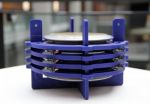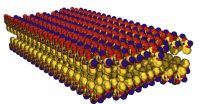(Press-News.org) New Rochelle, NY, September 2, 2014—A lifelong gluten-free diet (GFD) is the conventional approach to managing celiac disease, a chronic inflammatory disorder affecting the small intestine that can result in malnutrition. However, recent evidence shows that a GFD may not be sufficient to prevent serious complications related to celiac disease. A detailed discussion of the metabolic disorders and functional abnormalities that can develop, and nutritional treatments for these is presented in a Review article published in Journal of Medicinal Food, a peer-reviewed journal from Mary Ann Liebert, Inc., publishers. The article is available free on the Journal of Medicinal Food website until October 2, 2014.
Sara Farnetti and coauthors, Catholic University of the Sacred Heart (Rome, Italy), cover a broad scope of digestive and nutrient absorptive processes in individuals with celiac disease that may be compromised due to increased inflammation. In the article "Functional and Metabolic Disorders in Celiac Disease: New Implications for Nutritional Treatment", the authors discuss how diminished gallbladder and pancreatic function, and increased gut permeability may contribute to the development of overweight and obesity, and impaired glucose and lipid metabolism and insulin secretion in these patients.
"This article reviews the extensive literature on lifelong gluten-free diet supplementation to celiac disease patients and makes outstanding recommendations," says Journal of Medicinal Food Editor-in-Chief Sampath Parthasarathy, MBA, PhD, Florida Hospital Chair in Cardiovascular Sciences, University of Central Florida, Orlando. "The authors conclude that plant oils and products are able to stimulate the gall bladder to promote the absorption process and provide better nutrition to these patients. The conclusion that a lifelong gluten-free diet provision must be accompanied by proper nutrient supplementation is a sound one; however, caution must be exercised in using fried oil as a gall bladder stimulant."
About the Journal
Journal of Medicinal Food is an authoritative, peer-reviewed, multidisciplinary journal published monthly in print and online. Led by Editors-in-Chief Sampath Parthasarathy, MBA, PhD, and Young-Eun Lee, PhD, Wonkwang University, Jeonbuk, Korea, this scientific journal publishes original research on the bioactive substances of functional and medicinal foods, nutraceuticals, herbal substances, and other natural products. The Journal explores the chemistry and biochemistry of these substances, as well as the methods for their extraction and analysis, the use of biomarkers and other methods to assay their biological roles, and the development of bioactive substances for commercial use. Tables of content and a sample issue may be viewed on the Journal of Medicinal Food website.
About the Publisher
Mary Ann Liebert, Inc., publishers is a privately held, fully integrated media company known for establishing authoritative peer-reviewed journals in many promising areas of science and biomedical research, including The Journal of Alternative and Complementary Medicine. Its biotechnology trade magazine, Genetic Engineering & Biotechnology News (GEN), was the first in its field and is today the industry's most widely read publication worldwide. A complete list of the firm's 80 journals, books, and newsmagazines is available on the Mary Ann Liebert, Inc., publishers website.
Contact: Kathryn Ryan, Mary Ann Liebert, Inc., (914) 740-2100, kryan@liebertpub.com
Mary Ann Liebert, Inc. 140 Huguenot St., New Rochelle, NY 10801-5215
Phone: (914) 740-2100 (800) M-LIEBERT Fax: (914) 740-2101
http://www.liebertpub.com
INFORMATION: END
Is a gluten-free diet enough to control the complications of celiac disease?
2014-09-03
ELSE PRESS RELEASES FROM THIS DATE:
Innovative algorithm spots interactions lethal to cancer
2014-09-03
Despite the revolutionary biotechnological advancements of the last few decades, an ideal anti-cancer treatment — one that's immediately lethal to cancer cells, harmless to healthy cells, and resistant to cancer's relapse — is still a dream.
But a concept called "synthetic lethality" holds great promise for researchers. Two genes are considered synthetically lethal when their combined inactivation is lethal to cells, while inhibiting just one of them is not. Synthetic lethality promises to deliver personalized, more effective, and less toxic therapy. If a particular gene ...
Transplanted stem cells help prevent bladder fibrosis after spinal cord injury
2014-09-03
Putnam Valley, NY. (Sept. 3, 2014) – A team of researchers from Korea and Canada have found that transplantation of B10 cells (a stable immortalized human bone marrow derived –mesenchymal stem cell line; B10 hMSC) directly into the bladder wall of mice modeled with spinal cord injury (SCI) helped inhibit the development of bladder fibrosis and improved bladder function by promoting the growth of smooth muscle cells in the bladder.
The study will be published in a future issue of Cell Transplantation and is currently freely available on-line as an unedited early e-pub ...
Penn study: Sepsis patients fare better in hospitals with higher case volumes
2014-09-03
PHILADELPHIA – Patients with sepsis, one of the most time-sensitive and hard-to-detect illnesses in medicine, are more likely to survive the life-threatening condition when treated at a hospital that sees a higher volume of sepsis cases. New research from the Perelman School of Medicine at the University of Pennsylvania shows a clear relationship between hospitals that treat the most cases of severe sepsis and lower rates of inpatient deaths among those patients. The study, led by David F. Gaieski, MD, an associate professor of Emergency Medicine at Penn, is published online ...
Pesticide risk assessments seen as biased
2014-09-03
In the October issue of BioScience, a group of ecotoxicologists argue that the US Environmental Protection Agency's (USEPA) current practices for evaluating pesticide safety are inadequate and likely to result in decisions biased toward industry interests.
In their article, Michelle Boone of Miami University and her colleagues note that most pesticide toxicity tests used in risk assessments are conducted by pesticide manufacturers themselves, which the authors believe can result in untenable conflicts of interest. Moreover, rigid inclusion criteria often mean that potentially ...
Seizures and sudden death: When SUMO 'wrestles' potassium channels
2014-09-03
A gene crucial for brain and heart development may also be associated with sudden unexplained death in epilepsy (SUDEP), the most common cause of early mortality in epilepsy patients.
Scientists at The University of Texas MD Anderson Cancer Center have created a new animal model for SUDEP and have shown that mice who have a partial deficiency of the gene SENP2 (Sentrin/SUMO-specific protease 2) are more likely to develop spontaneous seizures and sudden death. The finding occurred when observing mice originally bred for studying a link between SENP2 deficiency and cancer.
"SENP2 ...
Researchers unlock new mechanism in pain management
2014-09-03
It's in the brain where we perceive the unpleasant sensations of pain, and researchers have long been examining how calcium channels in the brain and peripheral nervous system contribute to the development of chronic pain conditions.
Neuroscientist Gerald Zamponi, PhD, and his team at the University of Calgary's Hotchkiss Brain Institute have discovered a new mechanism that can reverse chronic pain. Using an animal model, their research has found that pain signals in nerve cells can be shut off by interfering with the communication of a specific enzyme with calcium ...
Changing temperature powers sensors in hard-to-reach places
2014-09-03
A centuries-old clock built for a king is the inspiration for a group of computer scientists and electrical engineers who hope to harvest power from the air.
The clock, powered by changes in temperature and atmospheric pressure, was invented in the early 17th century by a Dutch builder. Three centuries later, Swiss engineer Jean Leon Reutter built on that idea and created the Atmos mechanical clock that can run for years without needing to be wound manually.
Now, University of Washington researchers have taken inspiration from the clock's design and created a power ...
Tweets during 2013 Colorado floods gave engineers valuable data on infrastructure damage
2014-09-03
Tweets sent during last year's massive flooding on Colorado's Front Range were able to detail the scope of damage to the area's infrastructure, according to a study by the University of Colorado Boulder.
The findings can help geotechnical and structural engineers more effectively direct their reconnaissance efforts after future natural disasters—including earthquakes, tsunamis and tornadoes—as well as provide them data that might otherwise be lost due to rapid cleanup efforts.
"Because the flooding was widespread, it impacted many canyons and closed off access to communities ...
Galapagos invasion is global warning
2014-09-03
A new study led by a PhD researcher at The University of Western Australia has revealed that parts of the iconic Galapagos Islands have been overrun by invasive plants from other parts of the world.
"People may be shocked that a place considered so iconic for biodiversity is so overrun with weeds in some areas despite ongoing control effort by National Park rangers, but this is really a global story," lead author from the UWA School of Plant Biology Mandy Trueman said.
The results published in the open access journal Neobiota confirm that in the humid highland part ...
Peptoid nanosheets at the oil-water interface
2014-09-03
From the people who brought us peptoid nanosheets that form at the interface between air and water, now come peptoid nanosheets that form at the interface between oil and water. Scientists at the U.S. Department of Energy (DOE)'s Lawrence Berkeley National Laboratory (Berkeley Lab) have developed peptoid nanosheets - two-dimensional biomimetic materials with customizable properties - that self-assemble at an oil-water interface. This new development opens the door to designing peptoid nanosheets of increasing structural complexity and chemical functionality for a broad ...




